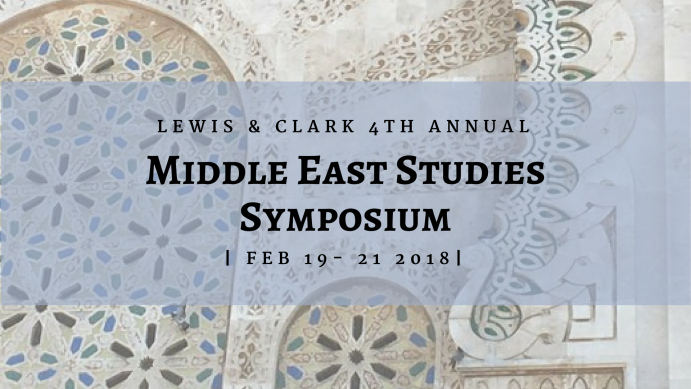Schedule

*Please note that this schedule remains subject to change
Monday February 19th
6pm-7pm, Howard 102
*Keynote Presentation
Dr. Omar Reda, OHSU
Dr. Reda a Libyan-American doctor specializing in forensic psychiatrist and teaches at Oregon Health Sciences University. Reda fled his homeland in 1999 upon receiving threat of arrest by Ghaddafi’s forces for delivering food and supplies to families of those imprisoned by the regime. Over the past decade, Reda has frequently returned to Libya to help those affected by conflict and has worked to create programs to help children recover emotionally from experiences of trauma.
7:15-8:30pm, Smith Hall
Symposium Dinner Banquet
Members of the Lewis & Clark Community are invited to attend a dinner banquet for all symposium presenters, organizers, and guests. This gathering is an opportunity to interact with presenters and recognize the efforts of the steering committee. This event is catered by Ya-Hala Lebanese Cuisine.
Tuesday February 20th
2pm-3pm, Albany 218
”The ‘Cyprus Conflict’: The Experiences of a Fulbright-Hayes Participant on an Island Divided”
Omeica Hudson, Department of Education Fulbright-Hayes Participant
“Collective Amnesia: The Multi-Cultural Contributions of Al-Andalus to Western Civilization”
Dr. Julia Banzi, Lewis & Clark Professor of Music
Presentation abstract: For almost 800 years, Al Andalus fostered an enlightened culture in which three great Abrahamic traditions — Judaism, Christianity, and Islam — co-existed, interacted, and flourished. During the time of Al Andalus (711-1492), individuals of different ethnicities and faiths created an advanced and thriving culture which has had a lasting effect on world culture. So much of what we know and employ today dates back to this period. Modern-day science, technology, math, astronomy, medicine, music, agriculture, architecture, art and even clothing and dining etiquette can all find their roots centuries earlier in Islamic Spain. And yet, this is not a history with which many of us are familiar.The capacity of a memory to endure depends on the social power of the group that holds it and records that history. Collective memory implies by extension, the concept of collective forgetting. This phenomena has its own history. This presentation explores how older Iberian memories continue to influence our present and how the period of Al Andalus, often entirely ignored in our Western History books has had, and continues to have far reaching consequences in the present.
Morocco Student Research Panel
Moderator: Dr. Oren Kosansky, Lewis & Clark Professor of Sociology & Anthropology and Director of the Middle East & North African Studies (MENA) Minor.
Emily Hayes-Rich CAS ’19, “The Moroccan Khettara: State Influences Over Rural, Desert Morocco from the 7th Century to the Present.”
Wednesday February 21rst
12:30pm-1:30pm, Albany 218
Identity & Belonging : Student Research Panel
Naomi Goldman-Nagel CAS ’19, “Monologues From a Girl with a Multifaceted Identity.”
Lindsey Clark CAS ’18, “The Arab Spring ‘Success’ Case: Challenges to Tunisia’s Democratic Transition.”
Noam Margalit CAS ’18, “A Society Built on Death’: Examining the Presence and Absence of Dying in Israel.”
“Explaining Women’s Electability: Role Congruity and the Importance of Candidate Type”
Dr. Lindsay Benstead, Portland State University Professor of Political Science and Interim Director of the Middle East Studies Center (MESC)
Presentation abstract: Ensuring female representation has been at the forefront of the global development agenda. Yet, little is known about which traits or social, economic, or political roles make women more electable. When and why do voters cast ballots for women, and how can insights into this help scholars, policymakers, and development specialists have a clearer understanding of the prospects of increasing women’s roles? Gender role congruity theory argues that bias against females for leadership roles stems from a mismatch between stereotyped gender roles and the traits associated with a “good leader.” We extend this theory by arguing that the credentials that candidates emphasize, such as their success as business entrepreneurs or civil society activists, has a significant influence on the extent to which voters prefer male over female voters because candidates are also judged as effective occupants of these roles when considered as future political leaders. Drawing on data from four original survey experiments conducted in Tunisia, Egypt, and Jordan between 2012 and 2014, we show that electability varies according to the skills candidates bring to the job. In the survey experiment, respondents were presented at random with brief descriptions of candidates who were either male or female and engaged in civil society work or business. We find strong and consistent evidence across the four countries that voters prefer business candidates to civil society candidates. Moreover, males in particular prefer male candidates to female candidates. But, the gender gap in electability is larger for business candidates – roles for which women are often stereotyped as unfit – than civil society candidates. When male and female candidates are running on civil society platforms, the gender bias at the polls is narrowed. We argue that this is because many view women as caring and community-oriented, and thus as having the traits that many equate with successful civil society activists.
6pm, Stamm
Musical Performance by the Al Andalus Ensemble
Al-Andalus Ensemble an award winning musical ensemble that performs both traditional Andalusian music and contemporary work. It is internationally known for its innovative fusion of Middle Eastern, North African, European and American traditions, which it represents through world, jazz, flamenco and classical music. The group’s spectrum of work includes original Nuevo-Andalusian and jazz pieces to stirring renditions of American spirituals to thrilling, improvised percussion solos played on traditional clay drums, and much more.